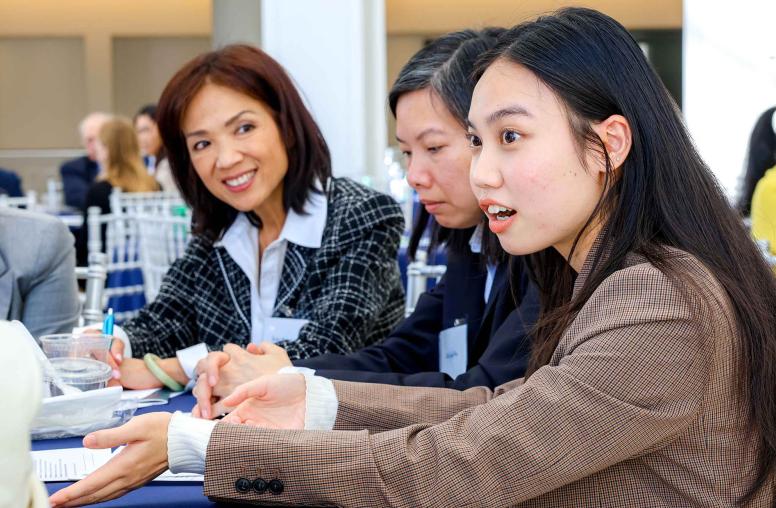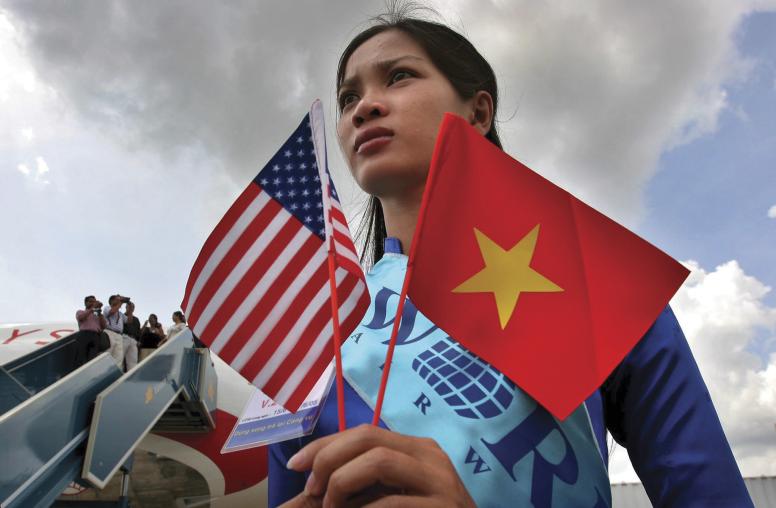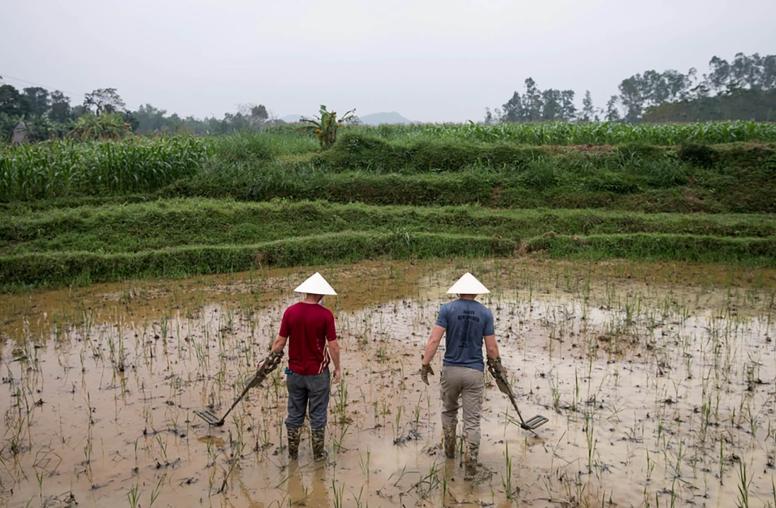Are There Lessons from Vietnam for U.S. Reconciliation with the Taliban?
If the U.S.-Vietnam experience is any guide, reconciliation in Afghanistan will be lengthy and nonlinear — yet ultimately achievable.
The Taliban’s rapid victory in Afghanistan evoked many comparisons to the collapse of the South Vietnamese regime and U.S. evacuation from Saigon in 1975. Ironically, during the same week in late August that the last U.S. forces were withdrawing from Kabul, U.S. Vice President Kamala Harris carried out a remarkably successful visit to Hanoi. U.S.-Vietnam relations have arguably never been better — a stark contrast to the scent of failure in Afghanistan.

The circumstances of the United States’ wars in Vietnam and Afghanistan were, to be sure, diverging. The North Vietnamese capture of Saigon came at the end of a violent military campaign, while Afghan provinces surrendered without a fight. The Taliban and the Communist Party of Vietnam could not be more different in ideology, history and organizational structure. And Vietnam’s civil war took place amid a global power struggle with the Soviet Union that has no counterpart with the inchoate terror networks the United States pursued in Afghanistan.
In the aftermath of the fall of Kabul, it is difficult to imagine that the United States could ever have a normal relationship, let alone a “comprehensive partnership,” with the winners of that conflict. The postwar history of U.S.-Vietnam ties show, however, that such an outcome is possible, though difficult and time-consuming. How did these two former enemies reconcile, and what lessons could U.S. and Afghan leaders draw for the postwar period?
The United States and Vietnam: A Journey to Partnership
USIP defines reconciliation as “the long-term process by which the parties to a violent dispute build trust, learn to live cooperatively and create a stable peace.” In the quarter century since the United States and Vietnam normalized diplomatic relations in 1995, steps toward reconciliation have been gradual yet consistent. Normal bilateral trade relations were established in 2001, followed by growing military-to-military relations, cultural and educational exchange and assistance on health and climate change. The United States is now Vietnam’s second-largest trading partner after China. Economic, social and security cooperation form the pillars of the comprehensive partnership signed in 2013. During Harris’ visit, Vietnamese leaders emphasized that the United States is “one of our most important partners.” On her part, the vice president reaffirmed U.S. support for a “strong, prosperous, and independent” Vietnam.
The first 20 years after the end of the Vietnam War, by contrast, were far from smooth, with many pitfalls and missteps on the path to reconciliation. Initial efforts during the Carter administration, led by Richard Holbrooke and Leonard Woodcock, faltered due to Vietnamese expectations of reparations and were soon superseded by the U.S.-China détente. Vietnam’s 1978 invasion and occupation of Cambodia, followed by China’s retaliatory attack on Vietnam and a mass exodus of Vietnamese refugees, froze U.S.-Vietnam relations in continued Cold War opposition. Although Vietnam began its well-known đổi mới economic renovation in 1986, the Cambodian conflict persisted until 1991 and a U.S. trade embargo remained in force until 1994.
With official channels restricted, U.S. and Vietnamese citizens began to engage in rebuilding trust themselves. U.S. veterans, businesses and peace activists visited Vietnam in the late 1980s and set up charitable and development programs. Families of soldiers listed as missing in action pressed for information and recovery of their remains. The ensuing joint program to obtain the fullest possible accounting of MIAs proved to be a diplomatic breakthrough. Congressional champions, notably U.S. Sens. John McCain and John Kerry, became the driving forces for normalization. As McCain, a former prisoner of war in Vietnam, told then-President Bill Clinton, “I’m tired of looking back in anger. What’s important is that we move forward now.” With the lifting of the trade embargo and diplomatic recognition, U.S. policy shifted to supporting Vietnam to succeed in its own development.
Exorcising the “Last Significant Ghost”
With Vietnam, the most difficult issues to resolve have been the long-term legacies of unexploded ordnance (UXO) and Agent Orange. Although the U.S. government has not accepted legal responsibility for cleanup, it has provided more than $584 million to date for mine and UXO removal, remediation of contaminated military bases at Da Nang and Bien Hoa and medical and disability assistance on a humanitarian basis. With the leadership of U.S. Sen. Patrick Leahy and many others, these efforts are gradually exorcising the “last significant ghost” from the Vietnam War. USIP’s Vietnam War Legacies and Reconciliation Initiative, launched in August 2021, aims to deepen U.S.-Vietnam dialogue and understanding toward a full resolution of the consequences of war.
Signposts for U.S.-Afghan Reconciliation
What lessons might these experiences hold for the vastly different context of a Taliban-led Afghanistan? One fundamental axiom is to keep diplomatic channels open, even — and indeed especially — with former enemies. Continued political and economic engagement with the Taliban is a priority to address the humanitarian crisis as well as counterterrorism interests. This does not require immediate recognition of the Taliban regime. While communication channels do not guarantee results, no progress will happen without them. If the United States and the Taliban find pathways to stay in contact and discuss their inevitable differences, it is possible that the time frame for building a postwar relationship could be telescoped.
Second, the postwar Indochina experience illustrates the risks of regional entanglements. U.S.-Vietnam rapprochement became conditioned on geopolitics with China on one side and Cambodia on the other. It was only when the Cold War prism shifted that a bilateral relationship could emerge on the basis of shared interests. By analogy, U.S. and Afghan leaders could increase the chances of future reconciliation by keeping international terrorist networks off Afghan soil and minimizing the spread of instability from Afghanistan to neighboring countries.
Third, the U.S.-Vietnam partnership has demonstrated that it is possible to make progress on common issues of concern, such as war legacies, while acknowledging important political differences on democracy and human rights. The United States does not seek to remake Vietnam in its own image. This would not be possible even if it were desirable. Instead, trust that the United States respects Vietnamese sovereignty is a prerequisite for open discussion of the shortcomings of either side. Rather than merely express shock when violations and repression occur, in Afghanistan as in Vietnam or elsewhere, the United States should seek practical ways to improve implementation of the commitments that governments have already made.
A Long Road, But an Achievable Goal
In his speech on the end of the war in Afghanistan, President Biden announced the United States was “ending an era of major military operations to remake other countries.” Indeed, the postwar history of Vietnam shows that national interests on all sides can be met more effectively through diplomatic and peaceful means. During the “forever war” in Afghanistan, U.S. commanders sought to apply military lessons from Vietnam with decidedly mixed results. Perhaps the process of rebuilding relations with Vietnam after the war will provide more pertinent learning for a foreign policy rooted in diplomacy, peacebuilding and development. If the Vietnamese experience is any guide, postwar reconciliation in Afghanistan will be lengthy and nonlinear — yet ultimately achievable.



